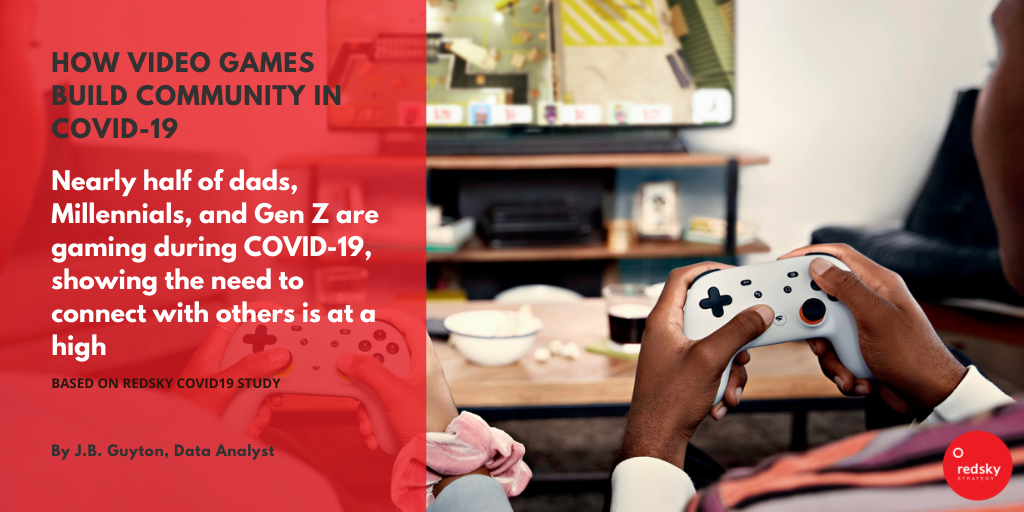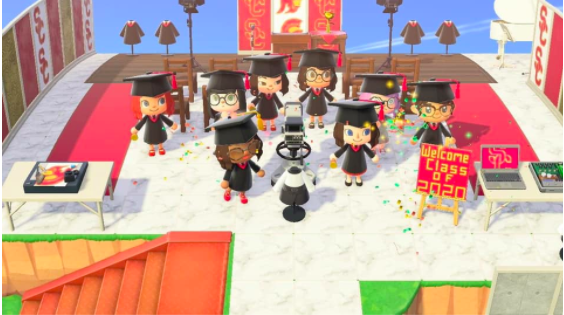News
How Video Games Build Community in COVID-19

By J.B. Guyton, Data Analyst
My last semester of graduate school at the University of Southern California was cut short due to our current situation. The tight-knit relationships that I had developed with those in my cohort was interrupted, and our highly-anticipated graduation was cancelled (we were all hoping that Will Ferrell was going to be the guest speaker again). Although it was not the best situation, we found unique ways to bond outside of Zoom including building a virtual world where we held our own graduation ceremony in a video game called Animal Crossing. We were able to customize and personify our own characters and celebrate each other together. There’s a reason The Wall Street Journal has dubbed Animal Crossing, “Coronavirus Therapy”.

The Rise of Video Games During COVID-19
We’ve talked before about how the pandemic has given rise to unprecedented levels of gaming (see: TikTok-From New Family Night To Social Justice Megaphone). Nearly half of all dads, Millennials, and Gen Z-ers are gaming during COVID-19. Many are dusting off their old systems or buying new ones so that they can bond with friends, family, co-workers, and classmates. I even decided to go through the trouble of building my own computer so that I could “hangout” with my brother and “see” my friends who live down the street.
The need to connect with others is at an all time high, as millions are suffering from loneliness and yearning for human interaction. Zoom has become the norm, but still lacks some of the engagement people are searching for. That’s where large scale gaming comes into play Major gaming platforms have seen a tremendous increase in popularity during the pandemic. Twitch, a live streaming platform where everyone from the biggest gamers to the most casual n00bs can show off their skills, has seen a 24% boost in viewership. Steam, a digital video game distribution system, hit an all-time high in March with over 20 million people playing on the platform at once. Twitch and Steam have shown how massive, online, multiplayer games can act as virtual communities to make new friends and form strong bonds. Specifically, games such as Fall Guys and Animal Crossing have had tremendous success during COVID. In just the first week of the Fall Guys release there were over 10 million downloads, and Animal Crossing has had over 22 million copies sold since their launch this summer. Such games are successful during this pandemic due to their social aspects, as people are searching for human interaction and connection. Fall Guys allows you to compete with players all across the world and feel challenged, while Animal Crossing embodies an autonomous and interactive virtual community.
According to RedSky Strategy’s own proprietary research, a fifth of Americans are feeling depressed and nearly half are experiencing elevated amounts of anxiety. These in-game worlds allow users to feel real life feelings of socialization and a sense of community. Whether it is taking first place in the Fall Guys battle royale, or assisting your friend in Animal Crossing to grow their farm, friends and family can come together online to achieve a common goal. The socialization aspects of these multiplayer games allow people to connect as if they were in the real world.
Why are Video Games so Successful now?
According to gaming experts Dr. Richard Bartle and Dr. Scott Rigby, video games allow us to feel a sense of autonomy, relatedness, and competence. In this stay at home world, these are three common emotions that people are struggling with. As a result, people are turning to video games to experience these feelings. In these virtual worlds people have the freedom to make choices, communicate with others, and overcome challenges. Mimicking the real world, one can begin to build relationships with their online characters as they interact with other people inside the virtual community.
Video games have always been a way to form connections with others, and are especially pertinent right now. Building relationships is an essential human need. We previously touched on the importance of face-to-face interaction in Human Connection in a Remote World. These multiplayer games like Fall Guys and Animal Crossing can truly drive purpose and meaning in our disconnected world.
The evolution of the video game industry during COVID-19 has shown us a few things. Consumers desire human connection. Traditional notions of who your audience is should be re-evaluated. Finally, it has shown us the potential for long-term changes to audiences in various industries.
At RedSky Strategy, we follow the HumanSight approach. We look at consumers through an empathetic, personal lens to drive innovation and growth strategies. Societal changes are ever present, and will go through dramatic shifts like we’ve seen in the past six months. We aim to assess these changes, leverage consumer insights and adapt marketing strategies to make the biggest impact for our clients and ultimately, their customers.
